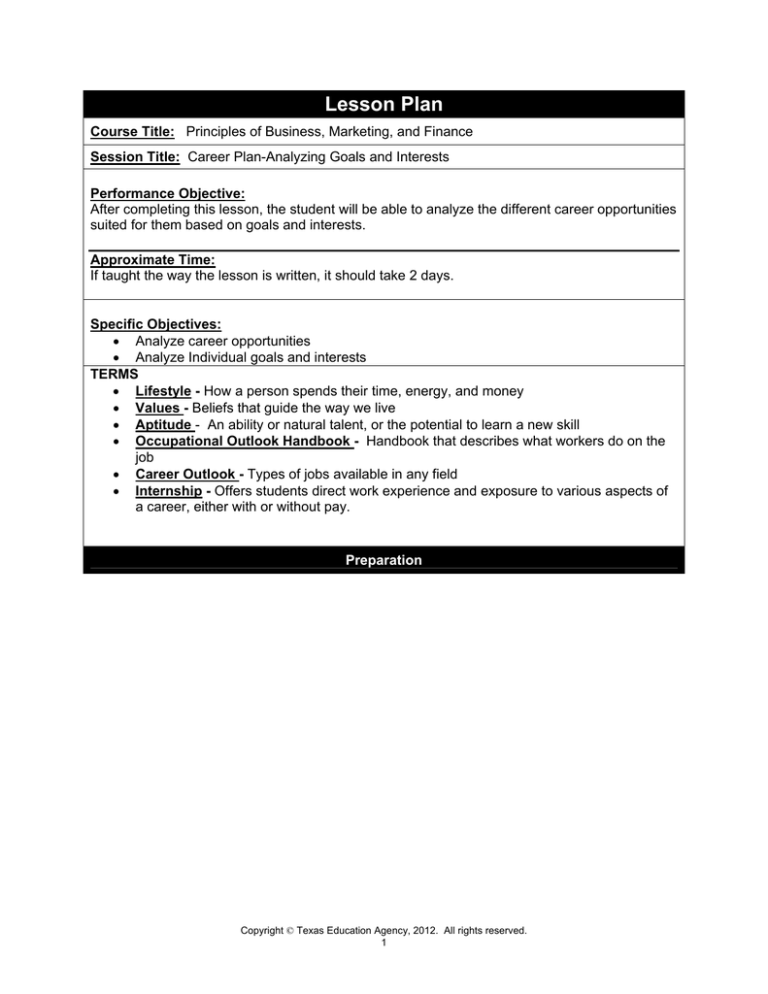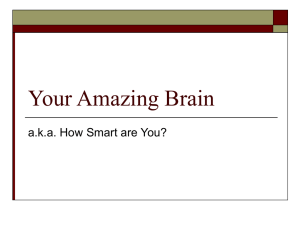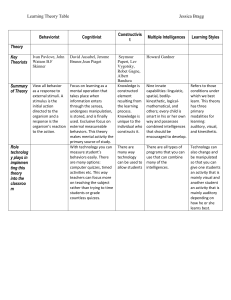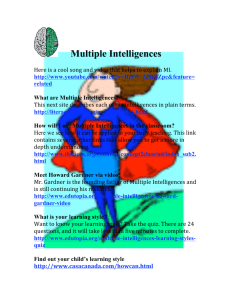Lesson Plan
advertisement

Lesson Plan Course Title: Principles of Business, Marketing, and Finance Session Title: Career Plan-Analyzing Goals and Interests Performance Objective: After completing this lesson, the student will be able to analyze the different career opportunities suited for them based on goals and interests. Approximate Time: If taught the way the lesson is written, it should take 2 days. Specific Objectives: Analyze career opportunities Analyze Individual goals and interests TERMS Lifestyle - How a person spends their time, energy, and money Values - Beliefs that guide the way we live Aptitude - An ability or natural talent, or the potential to learn a new skill Occupational Outlook Handbook - Handbook that describes what workers do on the job Career Outlook - Types of jobs available in any field Internship - Offers students direct work experience and exposure to various aspects of a career, either with or without pay. Preparation Copyright © Texas Education Agency, 2012. All rights reserved. 1 TEKS Correlations: This lesson, as published, correlates to the following TEKS. Any changes/alterations to the activities may result in the elimination of any or all of the TEKS listed. 130.112 (c) (15) The student analyzes career opportunities and formulates a career plan 130.112 (c)(15) (A) Analyze individual goals and interests Interdisciplinary Correlations: English: 110.33(b)(1)(A) – Reading/Vocabulary Development …determine the meaning of grade-level technical academic English words in multiple content areas (e.g., science, mathematics, social studies, the arts) derived from Latin, Greek or other linguistic roots and affixes. 110.33(b)(1)(B) – Reading/Vocabulary Development … analyze textual context (within a sentence and in larger sections of text) to draw conclusions about the nuance in word meanings. 110.33(b)(1)(C) – Reading/Vocabulary Development …infer word meaning through the identification and analysis of analogies and other word relationships. 110.33(b)(9)(C) – Reading/Comprehension of Informational Text/Expository Text …make and defend subtle inferences and complex conclusions about the ideas in text and their organizational patterns. 110.33(b)(11)(B) – Reading/Comprehension of Informational Text/Procedural Text …translate (from text to graphic or from graphic to text) complex, factual, quantitative, or technical information presented in maps, charts, illustrations, graphs, timelines, tables and diagrams. 110.33(b)(12)(A) – Reading/Media Literacy …evaluate how messages presented in media reflect social and cultural views in ways different from traditional texts. 110.33(b)(12)(B) – Reading/Media Literacy …evaluate the interactions of different techniques (e.g., layout, pictures, typeface in Copyright © Texas Education Agency, 2012. All rights reserved. 2 print media, images, text, sound in electronic journalism) used in multi-layered media. 110.33(b)(12)(C) – Reading/Media Literacy …evaluate the objectivity of coverage of the same event in various types of media. 110.33(b)(12)(D) – Reading/Media Literacy …evaluate changes in formality and tone across various media for different audiences and purposes. Accommodations for Learning Differences: It is important that lessons accommodate the needs of every learner. These lessons may be modified to accommodate your students with learning differences by referring to the files found on the Special Populations page of this website. Occupational Correlation (O*Net – www.onetonline.org/ ) This is relative to the individuals sitting in the classroom and/or teaching this course. Career and Technical Education Teacher, Secondary Education 25-2031.00 Similar Job Titles: Business Teacher, Accounting Teacher, Marketing Teacher Tasks: Plan and conduct activities for a balanced program of instruction, demonstration, and work time that provides students with opportunities to observe, question, and investigate. Prepare, administer, and grade tests and assignments to evaluate students' progress. Establish and enforce rules for behavior and procedures for maintaining order among students. Soft Skills: Instructing, Learning Strategies, Speaking Introduction Teacher Preparation: Teacher will review the terms in the outline, presentation, and handouts to become familiar with lesson. References: Textbooks: Marketing Essentials, Glencoe –Ch. 37 Multiple Intelligences-What Are Yours? Handout http://literacyworks.org/mi/assessment/findyourstrengths.html Copyright © Texas Education Agency, 2012. All rights reserved. 3 Instructional Aids: Projector/PowerPoint Textbooks and websites that the teacher deems necessary Materials Needed: Printer Paper Assignment handouts Learner Preparation: Tell the students the main objective of today’s lesson is to formulate a career plan based on analyzing individual goals and interests. They will look at the factors that affect and influence their career decisions and plans. Introduction Introduction: ASK: How many of you think about what career you would like to go into after high school? Does anyone have a current job? Do you like the job you have? Discuss answers with class. SAY: Working in a career that makes you happy is important. Determining what makes you happy takes considering your lifestyle and interests, and choosing a field surrounding them. The average 18 yr. old will have 10 jobs by the age 25. Most people must work 40 years or more in their lifetime, so it is important to find work that is fulfilling. ASK: Students to think of reasons that it is important to research careers in more than one field of interest. What really interests them? What about a hobby? Could you see yourself doing a hobby as a career? Outline Outline: Instructors can use the presentation, slides, handouts, and note pages in conjunction with the following outline. MI Outline Copyright © Texas Education Agency, 2012. All rights reserved. 4 Notes to Instructor I. Careers A. Questions about career thoughts B. Hobby as a career II. P.P.-Choosing A Career A. The Six Step Process 1. Define your lifestyle goals 2. Conduct a self-assessment 3. Identify possible career choices 4. Evaluate your choices 5. Make your decisions 6. Plan how you will reach your goal B. Lifestyle 1. What type of lifestyle do you live? 2. What type of lifestyle would you like To have? 3. What changes have to be made? C. Lifestyle Influences 1. Where you live 2. Your cultural environment 3. Your mode of transportation 4. Your relationships with your family and friends 5. The work you do to earn a living D. Values E. Aptitude III. Multiple Intelligences-What are Yours? Verbal Linguistic Logical Mathematical Visual Spatial Musical Rhythmic Bodily Kinesthetic Intrapersonal (2 day lesson)Guided PracticeAfter Introduction, have students write a paragraph on how they could use their favorite hobby in their career. Using the presentation as visual aid, go through the six step process that helps to identify career choices. Independent Practice: Hand out the Multiple Intelligences evaluation. (Go to literacyworks.org Explain that Dr. Gardner researched human intelligence and came up with the theory of multiple intelligences. He believed that intelligence was not just I.Q. There are various ways people demonstrate how smart they are. Have students fill out and then discuss results as a class. Continue with Formal Assessment-(see below) Interpersonal Copyright © Texas Education Agency, 2012. All rights reserved. 5 Naturalist Existentialist Application Guided Practice: The presentation and lesson on the six step process to help identify career choices. Independent Practice: 1. Paragraph on incorporating a hobby into a career. 2. Multiple Intelligences-What Are Yours? Summary Review: What are the six steps to help identify career choices? What are the different multiple intelligences? Evaluation Informal Assessment: Instructor will be observant with students during all assignments. Instructor will move about the classroom setting, providing feedback and making sure that students are participating and engaged with lesson. Formal Assessment: Multiple Intelligence Assignment: Have students identify the 3 parts that have the highest scores. Research jobs on the Internet that fit with these multiple intelligences. Write a paper listing the jobs and explain why their reasoning why the job fits. Grade with written paper rubric. Copyright © Texas Education Agency, 2012. All rights reserved. 6 Extension Extension/Enrichment: Have students research online classified ads, select one job, and create a poster or advertisement for this job. Copyright © Texas Education Agency, 2012. All rights reserved. 7 Handout 1.1: Multiple Intelligences – What Are Yours? Student: _____________________ Date: _____________________ Teacher: ____________________ Howard Gardner, an educational psychologist, researched human intelligence and came up with the theory of Multiple Intelligences. Gardner believed that intelligence was not just IQ; in fact, he discovered that there are various ways people demonstrate how smart they are. We just needed to look closer. To date he has come up with eight Intelligences, or “smarts,” as some people call them. They are: • Verbal/Linguistic (Word Smart) • Logical/Mathematical (Logic Smart) • Visual/Spatial (Image Smart) • Interpersonal (People Smart) • Intrapersonal (Self Smart) • Bodily/Kinesthetic (Body Smart) • Musical (Music Smart) • Naturalist (Nature Smart) 1. Read all of the statements below in the eight-part Multiple Intelligences quiz to discover your top three ways of being smart. 2. Use the following guidelines to select which number best describes you for each statement. 4 really like me 3 a lot like me 2 a little like me 1 not like me at all 3. Write the appropriate number in the blank after each statement. 4. Add up your scores, as instructed at the end of this handout (“Identifying Your Top Three Intelligences”). Part 1 1. I like words and language in general. _____ 2. I remember exact phrases and words people have said to me. _____ 3. I enjoy writing for myself and sometimes reading my writing to others. _____ 4. I like telling stories and discussing movies or TV shows I’ve seen. _____ 5. I like to write short-answer or essay tests more than multiple-choice tests. _____ _____________________________________________________________________________________________ © 2008 Toronto District School Board - 29 - Credit Recovery: Career Studies (GLC2O) Module 1 Part 2 1. I like math and math problems. _____ 2. I prefer planning out my work before actually doing it. _____ 3. I’m very interested in science and experiments. _____ 4. I like to ask questions and I enjoy reasoning out the answers. _____ 5. I like doing research and solving complex problems. _____ Part 3 1. I like colour and design. _____ 2. I have a good sense of direction and can read maps and charts well. _____ 3. I remember things I have seen well more than things I have heard. _____ 4. I enjoy drawing, building, and visualizing. _____ 5. Art is a favourite class of mine, as I understand form, shape, texture, and colour well. _____ Part 4 1. I get along well with others and enjoy spending time talking. _____ 2. I enjoy team sports more than individual sports. _____ Copyright © Texas Education Agency, 2012. All rights reserved. 8 3. I enjoy listening to other people’s stories and empathizing with their feelings. _____ 4. I like being the leader of a group who listens to other members’ ideas. _____ 5. People are energizing for me; parties, visiting, and making new friends is fun. _____ Part 5 1. I am relaxed and am able to re-energize when I’m alone. _____ 2. I prefer a small group of friends, not big crowds of people. _____ 3. I know who I am and how I feel about things most of the time. _____ 4. I enjoy thinking on my own about values and beliefs. _____ 5. I understand my areas of strength and weakness. _____ _____________________________________________________________________________________________ © 2008 Toronto District School Board - 30 - Credit Recovery: Career Studies (GLC2O) Module 1 Part 6 1. I enjoy moving around instead of sitting. _____ 2. I tend to tap and move my feet or hands when I’m in class. _____ 3. I learn best when it is a hands-on project, such as building or creating something. _____ 4. I am good at sports, as I have good coordination. _____ 5. I like to get up and take an active part in most activities. _____ Part 7 1. I would listen to my music all day if I could. _____ 2. I often hear songs and melodies in my head. _____ 3. I can follow the rhythm in music easily and I like dancing. _____ 4. I play or would like to play a musical instrument. _____ 5. I listen well and can distinguish which instrument is playing in a band or an orchestra. _____ Part 8 1. One of my favourite things to do is be outside. ______ 2. I like hiking in parks and observing plants, insects, and animals. _____ 3. I learn a lot when I go on a field trip and explore nature. _____ 4. I recycle always and read up on environmental issues. _____ 5. I’m interested in taking care of animals or marine life. _____ Identifying Your Top Three Intelligences 1. Add up your score for each of the above eight parts, and write it down in the space provided below. 2. Identify the three parts that have the highest scores. These are your top three Intelligences. Are you surprised? Write them down below, in the last line of this handout. 3. Do some additional research to find out more about what possible jobs might fit best with your top three Intelligences, then complete the following chart. _____________________________________________________________________________________________ © 2008 Toronto District School Board - 31 - Credit Recovery: Career Studies (GLC2O) Module 1 TOTAL SCORES 1. Verbal/Linguistic (Word Smart) __________ 2. Logical/Mathematical (Logic Smart) __________ 3. Visual/Spatial (Image Smart) __________ 4. Interpersonal (People Smart) __________ 5. Intrapersonal (Self Smart) __________ 6. Bodily/Kinesthetic (Body Smart) __________ 7. Musical (Music Smart) __________ Copyright © Texas Education Agency, 2012. All rights reserved. 9 8. Naturalist (Nature Smart) __________ My top three Intelligences are ____________________, ____________________, ____________________. Possible jobs to best fit my top three Intelligences: Type of Intelligence Best Job Fits for This Intelligence Copyright © Texas Education Agency, 2012. All rights reserved. 10 Multiple Intelligences Rubric CATEGORY 20 15 10 Organization Information is very organized with wellconstructed paragraphs and subheadings. Information is organized with wellconstructed paragraphs. Information is The information organized, but appears to be paragraphs are disorganized. not wellconstructed. Quality of Information Information clearly relates to the main topic. It includes several supporting details and/or examples. Information clearly relates to the main topic. It provides 1-2 supporting details and/or examples. Information clearly relates to the main topic. No details and/or examples are given. Information has little or nothing to do with the main topic. Quality of Writing Complete sentences with good variety, proper grammar, and correct spelling. Complete sentences, correct spelling and proper grammar. Need more variety in sentence structure. Complete sentences with some improper grammar. Some incomplete sentences and fragments, some misspelled words and poor grammar. Paragraph Construction All paragraphs include introductory sentence, explanations or details, and concluding sentence. Most paragraphs include introductory sentence, explanations or details, and concluding sentence. Paragraphs included related information but were typically not constructed well. Paragraphing structure was not clear and sentences were not typically related within the paragraphs. Amount of Information All topics are addressed and all questions answered with at least 2 sentences about each. All topics are addressed and most questions answered with at least 2 sentences about each. All topics are One or more addressed, and topics were not most questions addressed. answered with 1 sentence about each. Total Points Earned ________ Copyright © Texas Education Agency, 2012. All rights reserved. 11 5


